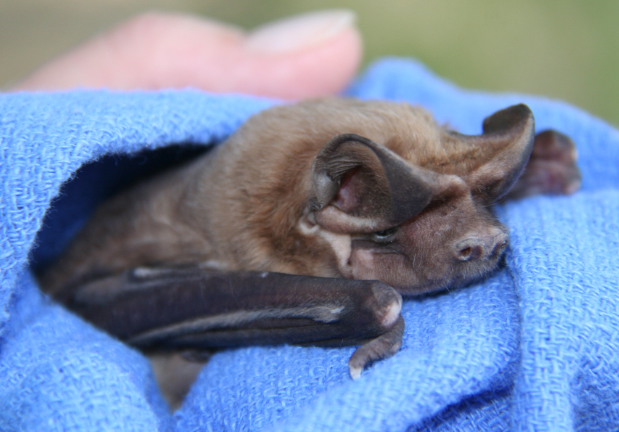Miami-Dade: Don't Ignore the Science
Slow down and consider Miami Wilds' impact on endangered animals
MIAMI, FL — The Miami-Dade County Commission is set to vote Tuesday, Oct. 20, on a lease to build Miami Wilds, a proposed water theme park that includes a retail area and two hotels. The project would be built on environmentally sensitive county land that is habitat for the Florida bonneted bat, the rarest bat in the U.S., and other endangered species unique to Florida. Last month the Miami-Dade Parks, Recreation and Cultural Affairs Committee recommended the Commission move forward, apparently without having considered the project's impacts on imperiled species.
The community engaged in the conversation about the future of Miami Wilds is emphasizing the critical importance of the pertinent science, and that there is no reason to rush the vote when neither the Commissioners nor their staff have had the opportunity to thoughtfully consider that science.
Steven Leidner, of the Miami-Dade Sierra Club group, said, "This science includes the latest acoustic field survey data collected by Bat Conservation International (BCI) that demonstrates that the proposed open space for leasing, next to the Zoo Miami and the pine rockland forest, is critical to the very rare and endangered Florida bonneted bat for foraging. A lot of time and resources have been invested to help recover this species. The proposed Miami Wilds development would push the bat and other species dependent on this area toward the brink of extinction. Water and theme parks come and go. Extinction is forever."
Paola Ferreira, executive director of Tropical Audubon Society, said, "Four endangered species are depending on the proposed project site for their survival, the scientific evidence is overwhelming. All these species are unique to South Florida and Miami Wilds will lead them to the brink of extinction. It is premature for the Board of County Commissioners to approve a 40 year lease for Miami Wilds on Oct. 20. Another location for the water park needs to be identified. No amusement park is worth the extinction of a single species."
Dr. Philip K. Stoddard, Department of Biological Sciences at FIU and former mayor of South Miami, said, "The Miami Wilds plan might be adjusted to make it compatible with the legal and scientific requirements for conservation, but it's not there yet. Attempting to fast-track the existing plan this month will certainly be met with lawsuits and roadblocks for violating the conservation requirements in the enabling citizen referendum and the Endangered Species Act. The project will proceed more smoothly, and probably more quickly, if the Commission grants time for scientists to complete the necessary conservation reports and use these to improve the plan."
Abigail Merolle, a Florida Internal University student, said, "It is estimated that less than 1,000 of the endemic Florida bonneted bats are left. A recent study from Bat Conservation International found that 70% of bonneted bat calls out of 10 sites were recorded over the open space considered for construction. This 2020 study and a 2012 Zoo Miami study provide clear evidence that this open space is critical for the species survival. The Miami tiger beetle is so critically endangered that it was thought to be extinct until it was rediscovered in 2007 in Zoo Miami pine rocklands. The Bartram's scrub-hairstreak butterfly was nearly driven to extinction due to shrinking habitat and declines in its host plant, the pineland croton. The pine rocklands are fire dependent and the proximity of Miami Wilds to this habitat will prevent regular controlled burns. Any Commission action must be made in accordance with this science."
Laura Reynolds of Conservation Concepts said, "The county prides itself on good planning and for that reason the county employs many experts who base their recommendations on science and the most up to date information available. We would hope that the county would adhere to their own Management Plan adopted and approved for the ecologically sensitive pinelands and follow the recommendation of not allowing hotels next to or on environmentally sensitive lands as protected under Chapter 24. The scientific basis for this is clear, maintaining pinelands requires fire and a hotel and pineland management do not mix. The Commission should slow down and take the time to consider this. This administration is putting itself at great risk of legal challenge, yet again."
Jaclyn Lopez, Florida director with the Center for Biological Diversity, said, "There's a mistaken perception that this land is just a vacant parking lot. In reality, this is extremely productive habitat for the Florida bonneted bat, a rare and spectacular Florida native. The county should make good on its promise to keep the water park off environmentally sensitive land."
Mike Daulton, executive director of Bat Conservation International, said "The Board of County Commissioners is hiding from Miami voters by closing its session on October 20 to public comment. A vote in favor of this horribly misguided proposed site for the Miami Wilds development project would violate the will of Miami-Dade voters, who agreed in a 2006 referendum that the development should not take place on 'environmentally sensitive land.' The science is clear: The open land proposed for this development is currently occupied, heavily used habitat for the federally endangered Florida bonneted bat. It's the picture in the dictionary next to the words environmentally sensitive."
Background
October 2020 Preliminary Report, Florida Bonneted Bat Acoustic Monitoring Project: Identifying critical habitat within Miami-Dade County in order to protect the rarest bat in the United States: https://www.batcon.org/wp-content/uploads/2020/10/Bat-Conservation-International-Preliminary-2019-Acoustic-Monitoring-Report.pdf
Oct. 20, 2020, Miami-Dade County Commission, agenda item 8H1, including draft lease: http://www.miamidade.gov/govaction/legistarfiles/Matters/Y2020/201818.pdf
Sept. 11, 2020, Miami-Dade Parks, Recreation and Cultural Affairs Committee meeting, agenda item 3E substitute: http://www.miamidade.gov/govaction/commagenda.asp?cmbmeetdate=4471
2012-2013 Zoo Miami Acoustic Survey of Eumops floridanus in Three Miami-Dade County Parks within the Richmond Tract: https://drive.google.com/file/d/1mvWMUgoiDY-sQEVRe-3452K57pXq4l0O/view?usp=sharing
2006 referendum approving an entertainment district “on Metrozoo property on land that is not environmentally sensitive and is outside the animal attractions”: http://www.miamidade.gov/govaction/matter.asp?matter=061795&file=true&yearFolder=Y2009

Florida bonneted bat; FWC photo by Gary Morse